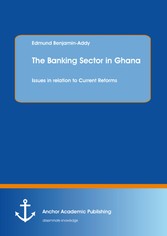Suchen und Finden
The Banking Sector in Ghana: Issues in relation to Current Reforms
1
Acknowledgement
4
Abstract
5
List of Tables and Figures
6
Abbreviations
7
Table of Content
9
Chapter One
12
1.0 Introduction
12
1.1 Background of the Study
12
1.2 Statement of the Problem
15
1.3 Objective of the Study
16
1.4 Research Questions
16
1.5 Research Methodology
17
1.5.1 Sources of Data
17
1.5.2 Data Collection and Analysis
18
1.6 Significance of the Study
19
1.7 Scope and Limitations of the Study
19
1.7.1 Scope
19
1.7.2 Limitations of the study
20
1.8 Chapter Disposition
20
Chapter Two - Literature Review
22
2.0 Introduction
22
2.1 Meaning of Capitalization
22
2.2 The Kinds of Capitalization
22
2.2.1 Over Capitalization
23
2.2.2 Under Capitalization
24
2.2.3 Watered Capitalization
26
2.3 Addressing Recapitalization Challenges Confronting Ghanaian Banks
26
2.4 The Need for Capitalizing Banks
28
2.5 A Sketch of the Reasons for and Against Recapitalization
30
2.6 Essentials for a Successful Recapitalization
31
2.6.1 Creating Stability during Transition
33
2.6.2 Managing the Burning “Regulatory” Fuse
35
2.6.3 Finding Investors
37
2.7 A Strategic Approach to Cost Reduction in Banking
38
2.7.1 Striking the Right Balance
40
2.7.2 Avoiding Arbitrary Cuts
42
2.7.3 Transforming Cost Reduction
42
2.7.4 Positioning for Growth through Smart Cutting
43
2.8 Recapitalizing through the Stock Market
44
2.8.1 Public or Private Offer
44
2.8.2 Initial Public Offerings (IPO)
44
2.8.3 Underwriters
45
2.8.4 Secondary Offering
45
2.8.5 Raising Capital
46
2.9 Effects of Sound Bank Capital on Bank Behaviour
46
2.10 Foundations for the Link between Relationships, Illiquidity, and Bank Capital
48
2.10.1 Negotiations between the Bank and the Borrower
48
2.10.2 Relationship Lending
49
2.10.3 Discipline from the Threat of a Bank Run
50
2.11 Disciplines from the Threat of Closure due to Capital Requirements
51
2.12 Challenges of Recapitalization
52
2.13 Prospects of Recapitalization
54
2.14 Summary and Conclusion
55
Chapter Three - Research Methodology
57
3.0 Introduction
57
3.1 Research Design
57
3.2 Study Population
58
3.3 Sampling Techniques
60
3.4 Research Instrument
61
3.5 Data Collection
62
3.6 Pretesting
62
3.7 Data Processing and Analysis
62
3.8 Ethical Considerations
64
Chapter Four Analysis of Data and Discussion of Findings
65
Chapter Four - Analysis of Data and Discussion of Findings
65
4.0 Introduction
65
4.1 Analysis of Demographic Features of Respondents
65
4.1.1 Analysis of Respondents Gender and Age
65
4.1.2 Respondents Highest Academic Qualification
66
4.1.3 Respondent’s Service Duration with their Banks
68
4.2 Issues Relating To Challenges of Mobility of Extra Cash for Recapitalization
69
4.2.1 Current Financial Position of Banks
69
4.2.2 Views on Strategies for Mobilizing More Cash
72
4.2.3 Views on How Industry Competition Is Impacting On Cash Mobilization Effort
76
4.2.4 Views on Challenges Encountered In Mobilizing More Operating Funds
79
4.3 Analysis of Issues Relating to the Attraction of Strategic Investors to Increasetheir Capital Base
82
4.3.1 Views on the Kind of Investor Arrangements That Banks Are Entering Into
83
4.3.2 Views on how Banks plan to invest extra funds that come with Recapitalization
84
4.4 Analysis of Issues Relating to Generating more Funds from Ghana StockExchange (GSE)
86
4.4.1 Views on Importance of GSE to the Banking Industry
86
4.4.2 GSE Products Easily Accessed by Banks
88
4.4.3 Views on Problems with Relying on GSE to raise Funds
89
4.4.4 Views on Whether GSE facilitates the Recapitalization Process
90
4.5 Analysis of Issues Relating to Reducing Cost to enhance the Recapitalization Process
92
4.5.1 Views on Operational Areas Where Cost could be reduced to enhance Liquidity
92
4.5.2 Views on Functional Areas of the Bank That Can Be Outsourced
94
4.5.3 Views on Ways of Reducing Cost between Banks to Enhance Liquidity
95
4.5.4 Views on How the Central Bank Could Assist the Banks in Reducing Cost
97
4.6 Findings
99
4.6.1 Efforts of Meeting New Minimum Capital Requirements
99
4.6.2 Cash Mobilization Strategies of Banks
99
4.6.3 Impact of Competition on Cash Mobilization Efforts
99
4.6.4 Challenges in Mobilizing More Funds to Recapitalize
100
4.6.5 The Reliability of Ghana Stock Exchange in Facilitating Recapitalization Process
100
4.6.6 Likely Areas for Cost Reduction by the Banks
100
4.6.7 Strategies for Reducing Overhead Cost
100
4.6.8 Functional Areas that can be outsourced to Cut Cost
101
4.6.9 Reducing Cost Associated with Relationship with Other Banks
101
4.6.10 Central Banks Assistance towards Improving Liquidity in Banks
101
Chapter 5 - Summary, Conclusion and Recommendations
102
5.0 Introduction
102
5.1 Summary
102
5.1.1 Chapter One
102
5.1.2 Chapter Two
102
5.1.3 Chapter Three
103
5.1.4 Chapter Four
103
5.1.5 Chapter Five
103
5.2 Conclusion
104
5.2.1 Challenges confronting Ghanaian Banks in meeting the Recapitalization Order
104
5.2.2 Challenges with Generating More Funds from the Ghana Stock Exchange torecapitalize
104
5.2.3 Sourcing Funds from International Strategic Investors
104
5.2.4 Reducing Operating Cost to improve working Capital
105
5.2.5 Central Banks Role in Assisting banks to recapitalize
105
5.2.6 Acquisitions, Mergers and International Support
105
5.3 Recommendations
105
5.3.1 Challenges with mobilizing free cash to recapitalize bank
106
5.3.2 Streamlining the stock exchange operations to enhance its effectiveness
106
5.3.3 Helping banks to cut cost
106
5.3.4 Central Bank to Guarantee International Loans to help Local BanksRecapitalize
107
Reference
108
Textbooks
108
Journals
109
Websites (Webology)
113
Other Sources
114
Appendix I -Questionnaire
117
Appendix II - Calculation of Operating Capital
127
Alle Preise verstehen sich inklusive der gesetzlichen MwSt.








